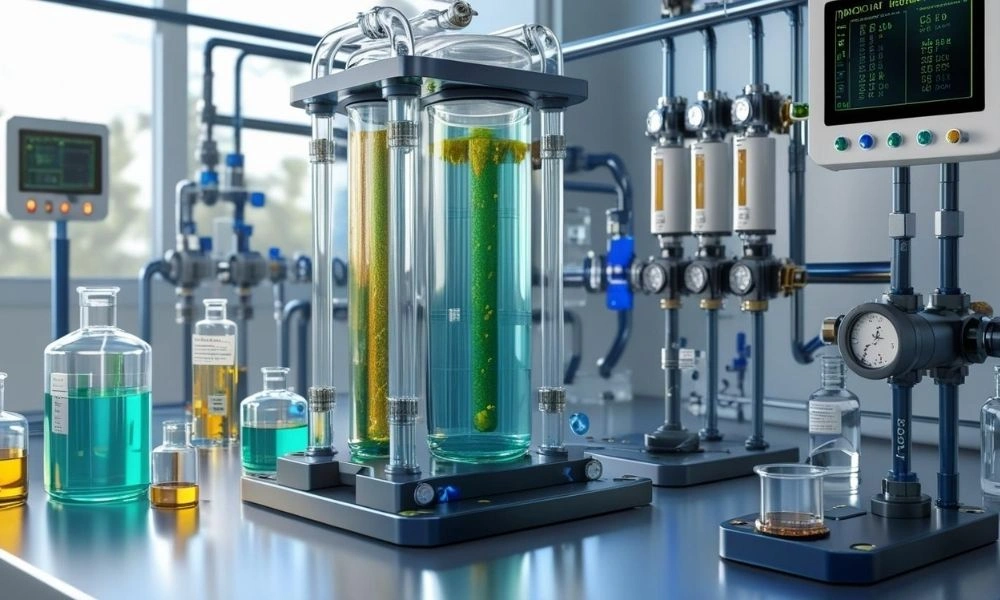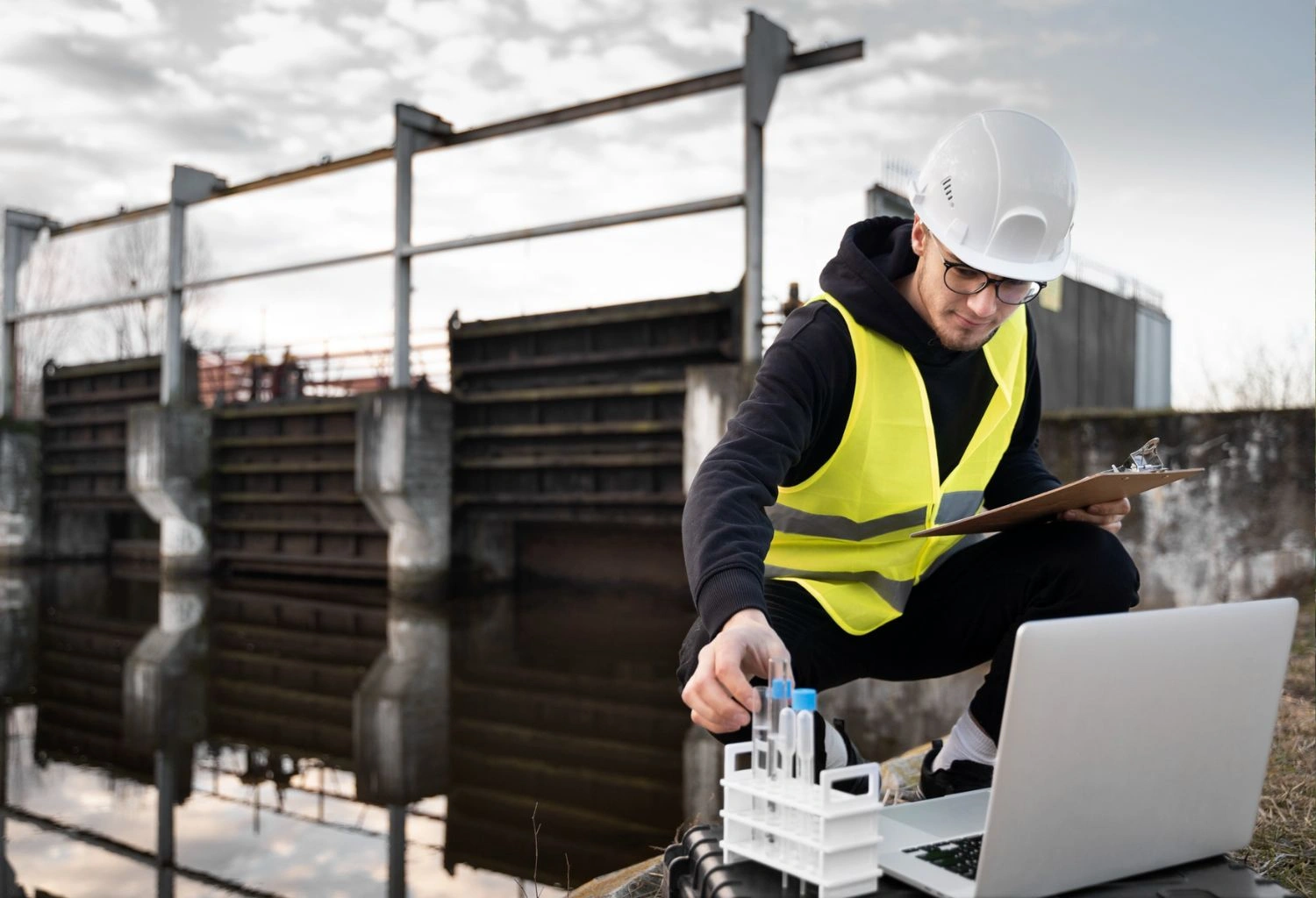The future is now: chemical-free water treatment Industrial wastewater treatment is vital for Pakistan’s environmental and regulatory future. WCSP offers smart, scalable solutions using bioremediation, AOP, electrocoagulation, and MBBR to treat complex industrial effluents. With over 17 years of experience, WCSP ensures NEQS compliance, sustainability, and efficiency through automation, IoT, and full support—empowering industries to protect health, cut costs, and meet ESG goals.
Industrial Water Treatment Chemicals
Why Industrial Wastewater Treatment is Important in Pakistan
Increasing Industrial Influence on Water Resources
Pakistan’s swift industrialization has caused economic progress, but at an environmental expense—specifically water resources. Textile, pharmaceutical, chemical, food processing, and manufacturing industries release enormous amounts of polluted water. Untreated, this wastewater contaminates rivers, damages ecosystems, and poses severe health threats.
Regulatory Compliance is Not Optional
Increasing pressure from environmental protection agencies requires adherence to National Environmental Quality Standards (NEQS). Inadequate treatment of wastewater results in hefty fines, plant closure, and loss of reputation.
Enter Smart Treatment Technologies
Old treatment systems tend to use antiquated techniques that are cost-intensive and inefficient. Enter smart, modular, and automated solutions—such as those provided by WCSP.
What Sets WCSP Apart as a Wastewater Solution Provider
More Than a Decade of Specialized Experience
Water Care Services Pakistan (WCSP) has been in service since 2007, catering to industries all over Pakistan with tailor-made water and wastewater treatment equipment. With ISO certifications and international compliance, WCSP offers credibility and outcomes.
Science and Technology Backed
WCSP utilizes the latest technologies for wastewater treatment:
- Sludge-Free Bioremediation
- Advanced Oxidation Processes (AOP)
- Electrocoagulation
- Moving Bed Biofilm Reactor (MBBR)
- Membrane Filtration & RO Systems
Every system is engineered for optimum efficiency, low power consumption, and minimal maintenance.
Tailored, Scalable, and Sustainable
From tiny industries to giant plants, WCSP’s modular designs may be sized up or down. All systems are optimized for energy efficiency, extended service life, and flexibility to fluctuating pollutant loads.
Emphasized Technologies in Smart Industrial Wastewater Treatment
Sludge-Free Bioremediation
Bioremediation is a biological process that employs enzymes and bacteria to degrade pollutants. WCSP’s sludge-free technology lowers disposal expenses and eliminates toxic byproducts. It’s perfect for organic-laden waste streams.
Advanced Oxidation Processes (AOP)
AOP entails the production of hydroxyl radicals, which oxidize even difficult-to-degrade substances such as pesticides or pharmaceuticals. It’s applied in chemical and textile industries where normal processes don’t work.
Electrocoagulation
This method applies electricity to remove emulsified oils, suspended solids, and heavy metals without chemicals. It’s very effective, efficient, and quick for intricate industrial wastewater.
Moving Bed Biofilm Reactor (MBBR)
MBBR systems are compact, have very low space requirements, and offer superior biological treatment. WCSP’s MBBR installations guarantee high COD/BOD removal with minimal operation requirements.
Integration with Automation and IoT
WCSP integrates SCADA systems and remote monitoring equipment so clients may monitor flow rates, pH, ORP, turbidity, and more—anywhere, anytime.
Applications Across Varying Industries
Textiles and Dyeing
Dyeing process wastewater has color, heavy metals, and organics. WCSP’s electrocoagulation + AOP combination eliminates these successfully, meeting NEQS requirements.
Pharmaceutical and Chemical Plants
These produce highly toxic, non-biodegradable products. WCSP’s membrane filtration and advanced oxidation provide safe, compliant discharge.
Food and Beverage Units
In this segment, high grease and organic load are major issues. WCSP’s bioremediation and MBBR systems are energy-efficient and deliver odorless effluent.
Oil and Petrochemical Facilities
Wastewater containing hydrocarbons requires special attention. WCSP treats emulsified oil and VOCs through a combination of electrochemical and biological processes.
Green & Blues
Benefits of Choosing WCSP for Industrial Wastewater Treatment
Cost-Efficiency Through Technology
Smart designs minimize power and chemical usage. Automation saves labor, and low-maintenance equipment saves money in the long run.
Environmental Responsibility
WCSP’s systems guarantee that water discharged is safe for reuse or environmental disposal, which aligns with your company’s ESG objectives.
Hassle-Free Maintenance & Support
From installation to after-sales support, WCSP provides full operational training, 24/7 support, and preventive maintenance plans.
Smart Industrial Wastewater Treatment Solutions in Pakistan: Future Outlook
As Pakistan progresses towards green industrial practices, the importance of smart industrial wastewater treatment solutions in Pakistan is even more pronounced. WCSP is at the vanguard of this revolution—providing intelligent, effective, and sustainable solutions specific to industrial requirements.
Frequently Asked Questions (FAQs)
1. Why is industrial wastewater treatment critical in Pakistan?
Untreated industrial wastewater pollutes rivers, damages ecosystems, and endangers human health—making proper treatment essential for sustainable and responsible industrial development.
2. Which industries contribute most to wastewater pollution in Pakistan?
Textile, chemical, pharmaceutical, food processing, and manufacturing sectors produce the largest volumes of contaminated wastewater in the country.
3. What are NEQS and why should industries comply?
NEQS stands for National Environmental Quality Standards. Industries must comply to avoid legal action, fines, or even forced shutdowns by regulatory authorities.
4. How does WCSP help industries meet regulatory standards?
WCSP offers custom-engineered treatment systems that consistently meet NEQS by using advanced technologies tailored to each industry’s specific wastewater.
5. What technologies are used in WCSP’s treatment solutions?
WCSP uses bioremediation, electrocoagulation, AOP, MBBR, membrane filtration, and RO—offering energy-efficient, low-maintenance, and highly effective wastewater treatment.
6. What is sludge-free bioremediation and its benefit?
It uses bacteria and enzymes to break down waste without generating sludge, reducing disposal costs and eliminating hazardous byproducts.
7. Are WCSP systems suitable for both small and large industries?
Yes, WCSP’s modular systems are fully scalable—designed to handle different capacities, from small workshops to large industrial plants.
8. How is smart technology integrated into WCSP systems?
WCSP integrates SCADA, IoT, and remote monitoring, allowing real-time data access, flow control, and performance tracking from any location.
9. What wastewater challenges do oil and chemical plants face?
They deal with VOCs, heavy metals, and emulsified oils. WCSP’s electrochemical and biological systems are designed to effectively treat these complex pollutants.
10. What after-sales support does WCSP provide?
WCSP offers full installation, operational training, 24/7 customer support, and preventive maintenance to ensure long-term system reliability and compliance.



